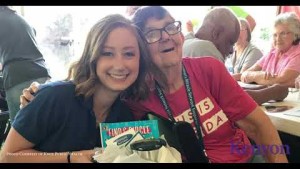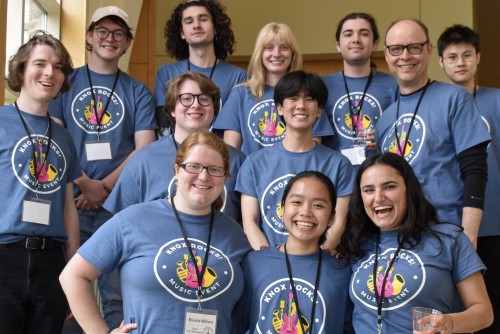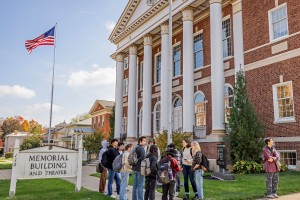Community engaged learning (CEL) is course work designed to address specific community needs and/or access community knowledge; it builds on partnerships between institutions of higher education and surrounding communities to identify and work with public issues that have both academic and public life dimensions. Part of Kenyon's Office for Community Partnerships, CEL provides students with opportunities for reflection on real-world, hands-on experiences.
“Even if students don’t remember in 10 years the readings that they did in class, they’ll remember [the community engagement experience], and so I think it really helps the ideas from the class stay with them in the long term.”
CEL Courses
Collaboration between Kenyon, Knox County and Beyond
A variety of courses with community engaged learning components are available each semester. Course topics span the breadth of academic programs offered at Kenyon and involve collaborations with partners including both local service providers and national organizations.
Community Engaged Learning Tiers
This type of CEL course could include (but not be limited to) a recurring speaker or speakers from the community, field trip(s) to a community location that is integrated with course materials, or learning with the community by engaging together with a text, film, or common question which results in learning from each other’s different perspectives. If these kind of interactions are consistent throughout the semester (rather than one to two times), then the course may be considered moderate or immersive.
This CEL course could include (but not be limited to) any of the above at a medium frequency of occurrence, performing service work, volunteering, all of which provide observation and interaction that allows students to connect what they are learning in the classroom to a real-life situation while being provided structured opportunities to reflect on these experiences.
An immersive CEL course could include (but not be limited to) any of the above at a high frequency of occurrence and often requires community-based research. Students use the skills and knowledge developed in the classroom to help answer a question that is of pressing concern to the community, while being provided structured opportunities to reflect on these experiences.
CEL Objectives
At Kenyon, community-based learning focuses on three objectives:
- To nurture a learning experience for students that promotes critical engagement with social realities, an integrative sense of purpose and capacity for connectedness and empathy.
- To be a resource for faculty to strengthen their knowledge of and engagement with the incorporation of CEL pedagogies into the Kenyon curriculum.
- To create bridges with community partners and foster a reciprocal exchange of knowledge and expertise between the Knox County community and Kenyon College.
Recent Collaborations
Kenyon students collaborated with local farm to learn about sustainable agriculture and with Knox Public Health to assist in designing and executing a new health assessment.

Sustainable Agriculture: Environmental studies students intertwine their coursework with experiential learning from a local farm. Exploring trends and innovations in sustainable agriculture, these students see applications on the ground level, and some even find new career paths.

Public Health: Sociology students collaborated with Knox Public Health to assist in designing and executing the 2021 Knox County Community Health Assessment, providing integral real-world research opportunities and an impactful partnership.
Assistant Director in the Office for Community Partnerships

